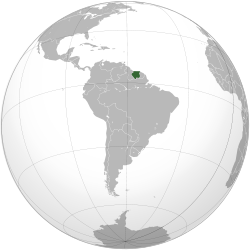User:Fentener van Vlissingen/sandbox2
Suriname | |||||||||
|---|---|---|---|---|---|---|---|---|---|
| 1954–1975 | |||||||||
 | |||||||||
| Status | Constituent country of the Kingdom of the Netherlands | ||||||||
| Capital | Paramaribo | ||||||||
| Common languages | Dutch | ||||||||
| Queen | |||||||||
• 1954-1975 | Juliana | ||||||||
• 1954-1956 | Jan Klaasesz | ||||||||
• 1963-1964 | Archibald Currie | ||||||||
• 1968-1975 | Johan Ferrier | ||||||||
• 1954-1955 | Archibald Currie | ||||||||
• 1955-1958 | Johan Ferrier | ||||||||
• 1963-1969 | Johan Adolf Pengel | ||||||||
• 1969-1973 | Jules Sedney | ||||||||
• 1973-1975 | Henck Arron | ||||||||
| Legislature | Estates of Suriname | ||||||||
| History | |||||||||
• Proclamation of the Charter for the Kingdom of the Netherlands | 15 December 1954 | ||||||||
• Surinamese independence | 25 November 1975 | ||||||||
| ISO 3166 code | SR | ||||||||
| |||||||||
Suriname was a constituent country of the Kingdom of the Netherlands between 1954 and 1975. The country had full autonomy, except in areas of defence, foreign policy, and nationality, and participated on a basis of equality with the Netherlands Antilles and the Netherlands itself in the Kingdom of the Netherlands. The country became fully independent on 25 November 1975.
History[edit]
The origin of the administrative reform of 1954 was the 1941 Atlantic Charter (stating the right of all peoples to choose the form of government under which they will live, and the desire for a permanent system of general security), which was signed by the Netherlands on 1 January 1942. Changes were proposed in the 7 December 1942 radio speech by Queen Wilhelmina. In this speech, the Queen, on behalf of the Dutch government in exile in London, expressed a desire to review the relations between the Netherlands and its colonies after the end of the war. After liberation, the government would call a conference to agree on a settlement in which the overseas territories could participate in the administration of the Kingdom on the basis of equality. Initially, this speech had propaganda purposes; the Dutch government had the Dutch East Indies (now Indonesia) in mind, and hoped to appease public opinion in the United States, which had become skeptical towards colonialism.[1]
After Indonesia became independent, a federal construction was considered too heavy, as the economies of Suriname and the Netherlands Antilles were insignificant compared to that of the Netherlands. In the Charter, as enacted in 1954, Suriname and the Netherlands Antilles each got a Minister Plenipotentiary based in the Netherlands, who had the right to participate in Dutch cabinet meetings when it discussed affairs that applied to the Kingdom as a whole, when these affairs pertained directly to Suriname and/or the Netherlands Antilles. Delegates of Suriname and the Netherlands Antilles could participate in sessions of the First and Second Chamber of the States-General. An overseas member could be added to the Council of State when appropriate. According to the Charter, Suriname and the Netherlands Antilles were also allowed to alter their “Basic Law's” (Staatsregeling). The right of the two autonomous countries to leave the Kingdom, unilaterally, was not recognised; yet it also stipulated that the Charter could be dissolved by mutual consultation.[1]
Moving towards independence[edit]
Whereas the Dutch government intitially tried to keep the former colonial possessions under Dutch sovereignty with far-reaching autonomy, this attitude changed in the 1960s, especially after the Netherlands New Guinea crisis of 1962, and the riots in Curaçao in 1969. Consensus among virtually all parties in Dutch parliament became that the costly dependencies in the Caribbean, over whose affairs the Dutch government had virtually no control, had to become independent as soon as possible. The Dutch Labour Party added to this political and economic reasonings an ideological argument: it found all remnants of colonialism wrong and a thing of the past.
When the Den Uyl cabinet took office in May 1973, it declared that it wanted the Caribbean countries within the Kingdom to become independent during its term in office. The Netherlands Antilles refused to cooperate, but Suriname proved to be a more willing partner. Though the cabinet of Jules Sedney did not feel for independence, the newly elected government of Henck Arron declared after Den Uyl's invitation that Suriname would become independent by the end of 1975. After long negotiations, and with a very substantial severance package amounting to 3.5 billion Dutch guilders of Dutch aid,[2] Suriname became independent on 25 November 1975.
Citations[edit]
- ^ a b Meel 1999.
- ^ Oostindie & Klinkers 2003, p. 108.
References[edit]
- Meel, P. (1999). Tussen autonomie en onafhankelijkheid. Nederlands-Surinaamse betrekkingen 1954–1961. Leiden: KITLV.
- Oostindie, G.; Klinkers, I. (2003). Decolonising the Caribbean; Dutch policies in a comparative perspective. Amsterdam: Amsterdam University Press. ISBN 9053566546.

